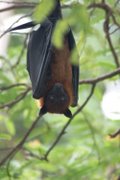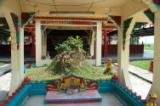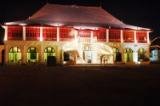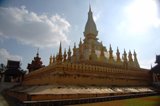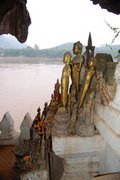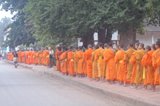These things only seemed so rampant in Asia. Or South East Asia to be more exact. Have you, for example, heard from friends coming back from Amsterdam (and this despite its close relationship with Indonesia), Stockholm or Hamburg saying their hotel room was haunted, or that some particular area in the Bavarian forest has a powerful spirit guarding it. The last time anyone mentioned anything about a ghost sighted in the Scandinavian area was the sighting of a one in Denmark some centuries ago. It was the ghost of Hamlet’s father who came to tell him that his death was a result of some foul play and not from natural causes as was first suspected. This had affected Hamlet so much that soon he became a loner. As is with most loners they tend to start talking to themselves. However, for Hamlet, his moments of solitude at least resulted in questions for us to ponder. As to whether it is to be or not to be, or whether one should suffer the slings and arrows of outrageous fortune or take arms against a sea of troubles. We certainly now know what the choice was for Zinedine Zidane when it boiled down to whether to head butt or not to head butt. Most certainly in both Hamlet’s and Zidane’s case there were method in their madness although we may not necessarily agree with them.
But back to our ghost story. Of course, some east European countries or the Irish countryside may have their fair share of fairies and Dracula, but those seemed to be more folklore to regale your friends at campfires rather than recent occurrences. Which is why the more likely stories you would hear when friends returned from that part of the world were close encounters of the second kind rather than the third. The European continent which over the years had seen a remarkable number of killings and ethnic cleansing should rightly be teeming with restless souls making their appearance or at least their presence felt to the unsuspecting Malaysian visitor to those countries. It would seem that this is certainly not the case.
However, go to any Southeast Asian country and you would come back with some supernatural tales or other to relate to an audience quite ready to gobble up such stories with gusto. This makes one wonder whether ghosts and such beings only reside in the tropics because of the year round warm weather. The only other places where you seem to get many tales from the dark side are certain parts of Africa, Central America and the Caribbean. Notice that again these countries are very near the equator and the tropics. Maybe beings like toyol, for example would find running around in the snow not very much to their liking. One acquaintance was kind enough to send me pictures of the said toyol through the internet recently, purportedly caught somewhere in Pahang or Indonesia. I must say the hairy little creature securely tied with a piece of string seemed scarier of its captors than scary itself. Well, I would too if I am about to be put in a bottle and buried alive. Maybe that was why its big red eyes were looking at the camera with so much sadness. The wonders of modern technology, eh? Just when you thought science had made nonsense of such superstitious beliefs, some genius had used his cell phone or digital camera to prove that technology is now going where man had not gone before. Capturing pictures of supernatural beings ghost buster-style.
Anyway China seemed to be the one notable exception to ghosts liking the tropics. However, the ghosts in China normally have a greenish hue and their favourite mode of travel is hopping from place to place rather than the effortless flying one would associate with their kind. At least that is what Hong Kong movie directors would like to have us believe is the way Chinese ghosts behave. And, one certainly wonders if only ghosts out to seek revenge act in this way just to scare the people who have wronged them a little bit more before delivering the coup de grace or whether all other ghosts, even when they were not out for blood would also act in a similar fashion as well.
Not having come up close and personal with any of these unnatural phenomena, I have never been able to support or disprove the stories and theories on these spiritual beings. Still I have always believed that the smarter thing is just to keep one’s mouth shut about things one is not particularly sure about. There is a Chinese proverb, which says that you should never speak bad of people in the day and never speak of ghosts at night. Wise saying if you ask me. The Thais and the Malays have added a bit more to this, which is not speaking about tigers when you are in the jungle or speak of crocodiles when in water infested with the reptile. Only the very brave or the utterly foolish would go so far as to say should either of the animals pop into view within the next few minutes, then one would like to break off their teeth to make key chains or necklaces and other trinkets with them. While admittedly such objects would make interesting conversation pieces, one should strive to be around and be an active member of the conversation rather than being the sorrowful subject of the discussion at such clan gatherings.
Since I do travel quite a bit in my line of work, many good Samaritans had felt very free to offer their advice on how to avoid being haunted in hotel rooms. It is unbelievable that these advices have come from the most unlikely of people. Most are highly educated and well travelled. Certainly not the kind you would normally associate with such superstitious beliefs. The warnings have included not putting your shoes together side by side or to throw your underwear all over an unused bed and so on. The advices have come by the dozens especially after the tsunami hit our part of the world two years ago.
I have had to travel quite a number of times to Phuket and the surroundings, where there were quite a number of casualties, especially Patong beach and Khaolak in neighbouring Phangnga Province. While some people were just offering advice on how to keep myself from being haunted, others were more curious as to whether the stories of visitors being haunted and such were true. Well, honestly I do not know. As I stated before, I have not had any first hand experience. I had stayed in a number of hotels by the beach and was even there when they had a remembrance night by lighting thousands of candles on Patong beach. I even took part in the candle lighting ceremony. But to this day, all I have ever heard were hearsay. A cousin of somebody’s sister’s friend who was a neighbour of somebody’s son-in-law’s office mate was supposed to have been haunted by ghosts of people who died in the tsunami. Like most stories which came through word of mouth, such tales tend to get embellished with more details with each telling. Maybe I am just one of those lucky people whose extra sensory perception is next to nil, thereby ensuring I would never be troubled by things that go passing in the night.
Still I have always taken heed of my late great grandmother’s advice (she should know living for 108 years). If you hear a strange noise, investigate the source first before determining whether you should start running. For all you know, it could just be a monitor lizard, which is probably more scared of you anyway. Experience had shown that the faster you try to run or outrun such creatures, the worse things were going to get. And should it be a tiger, what is the whole point of running anyway? You either stand your ground or slip behind the nearest big tree, wet your pants thoroughly and pray like there is no more tomorrow, for you at least. That seemed like a much better choice than running.
Wednesday, October 18, 2006
Wednesday, October 04, 2006
The lure of weekend markets & night bazaars
In the Chatuchak area of Bangkok, every Saturday and Sunday there is a weekend market, thus the now somewhat famous Chatuchak Weekend Market. Sometimes it is spelt as Jatujak. But, however it is spelt or mispronounced, Chatuchak is a market selling any and every kind of things you might ever want and even some you do not necessarily want but still ended up buying. Chatuchak is also a source of headache of monumental proportions. The heat, the sweat and a host of other bodily discomforts would see to it that you would return to your hotel room a few kilograms lighter with a heavy throbbing at the temples to boot.
What used to be a place where the masses shop has turned into a place where you go to rub shoulders with the rich and famous of Bangkok if not the whole of Thailand. Sort of a Thai St Tropez but minus the sand, sea and women clad in scanty bikinis. But my bet is the rich and famous just come to Chatuchak to be seen. To show they are cool and no different from the rest of us mortals. A way of saying we are still one of you and that we have not forgotten our roots and humble beginnings although we could certainly shop in trendier places now.
Still the rich and famous come to Chatuchak for the PR mileage. Walk around and looking interested in cheap t-shirts, sometimes posing for photographs with some eager fans, sign a few autographs, then walk off in search of something before eventually leaving much lighter then when they had first come. After a few more smiles and returning a few more obligatory wais (the Thai greeting) off they troop to the much trendier and cooler climates of the Paragon (at last count still the biggest shopping complex in Southeast Asia when it opened last year) for some English tea and crumpets. And to catch up on the latest gossips.
Still nothing like Chatuchak as a place to hang out and work up a sweat to lose that extra flab around the middle. No amount of preparation, short of wearing an air-conditioned suit will keep you from losing body fluid by the gallon. Now that sure beats going to the gym if you ask me. You can work up a sweat at no cost at all, except probably the few bahts you pay the tuk-tuk driver to take you there in the first place. Still if you do not experience the heat, the sweat and every other creature discomforts that come with it, including your tummy acting up just as soon as you step into the vicinity, then it would not be Chatuchak. It would be Suan Lum Night Bazaar, the sanitised and orderly night market with its more upmarket restaurants and bazaars. In contrast to Chatuchak, Suan Lum is the place for cool evening walks where you could pop into a fancy restaurant for a bite or a cup of latte after a pleasant evening stroll.
If you desire a jaunting which is a cross between Chatuchak and Suan Lum, then Khaosan Road is the place to go. A hippie haven in the 1970s, the place had certainly undergone a transformation. It is the place to be now. The old hotels and buildings are still there. Only now they have had facelifts and tummy tucks and fresh coats of paints to keep up with the modernisation of the new century, complete with internet cafes, better restaurants and drinking haunts. Drop by after the sun goes down and soon enough you would find yourself blending in with the crowd. The short stretch of road retains its 70s attitude but embraces all the trappings of a new era. You would still find a few old hippies who may have forgotten to go home or had come back to re-live some old experiences, dressed pretty much the same way as they did 30 years ago, albeit with more money in their pockets, even after factoring in the inflation and especially after factoring in the exchange rate which is very much in their favour.
Thailand is full of such walking streets and night bazaars. You find them in most major cities. In the north the most popular is the Chiang Mai Night Bazaar. Here you could find just about any handicraft item that could be fashioned out of any local product. Anything that could be sewn, moulded, carved, bent and scientifically or unscientifically turned into something saleable would be on display. Where else but in Chiang Mai would you find elephant droppings being packed in clear plastic bags and sold off as souvenirs to tourists. And mind you, there are people willing to dish out a few bahts for the honour of owning a bag of dried elephant faeces, presumably to be given away as a birthday present to the favourite mother-in-law.
Similar things could be found if you walk down the Walking Street in Pattaya. Everything else except the elephant by-product most certainly. Chiang Mai chose to retain exclusive rights on the subject of elephant post dietary movements of any sort. Just as well, because everything in Pattaya is double or treble the price of the same things found anywhere else. And if nothing else, elephant droppings should at least be a price-controlled item. Otherwise it would be the end of civilisation as we know it.
It is essential that you learn how to bargain in Pattaya. Even one who is extremely poor in that department as I, had occasionally been moved to enter into a verbal gymnastic with the sellers because of the way these petty traders and not so petty traders in Pattaya chose to price their goods. The prices naturally could be knocked down by half although they tend to turn their noses up at you just to make you feel like a cheapskate. Kind of reminds me of just such a place somewhere off Puduraya in Kuala Lumpur. No prizes for guessing the correct answer. They must have all gone to the same trade school.
Still what is life without the occasional bargains and bargain huntings? But then things in Pattaya, whether at its walking street or malls, have been known to be pricier than any other city in Thailand. This is a legacy of the Vietnam War. In the ‘60s and ‘70s, it was the place where American soldiers on a tour of duty in Vietnam come to rest and recuperate. It is debatable whether they in fact got more rest in Pattaya or in Saigon as Ho Chi Minh City was known then.
Pattaya may have changed to keep up with the rest of the world. But even minus the American soldiers on R & R, it is still very much a city catering to the whims and fancies of Caucasians, with its beer bars (which they call bar beer) and fancy hostesses. The drinks may cost more or go by a new name now. But the atmosphere is still lively and skirts still as short. Any shorter than that and you have to call them headbands.
What used to be a place where the masses shop has turned into a place where you go to rub shoulders with the rich and famous of Bangkok if not the whole of Thailand. Sort of a Thai St Tropez but minus the sand, sea and women clad in scanty bikinis. But my bet is the rich and famous just come to Chatuchak to be seen. To show they are cool and no different from the rest of us mortals. A way of saying we are still one of you and that we have not forgotten our roots and humble beginnings although we could certainly shop in trendier places now.
Still the rich and famous come to Chatuchak for the PR mileage. Walk around and looking interested in cheap t-shirts, sometimes posing for photographs with some eager fans, sign a few autographs, then walk off in search of something before eventually leaving much lighter then when they had first come. After a few more smiles and returning a few more obligatory wais (the Thai greeting) off they troop to the much trendier and cooler climates of the Paragon (at last count still the biggest shopping complex in Southeast Asia when it opened last year) for some English tea and crumpets. And to catch up on the latest gossips.
Still nothing like Chatuchak as a place to hang out and work up a sweat to lose that extra flab around the middle. No amount of preparation, short of wearing an air-conditioned suit will keep you from losing body fluid by the gallon. Now that sure beats going to the gym if you ask me. You can work up a sweat at no cost at all, except probably the few bahts you pay the tuk-tuk driver to take you there in the first place. Still if you do not experience the heat, the sweat and every other creature discomforts that come with it, including your tummy acting up just as soon as you step into the vicinity, then it would not be Chatuchak. It would be Suan Lum Night Bazaar, the sanitised and orderly night market with its more upmarket restaurants and bazaars. In contrast to Chatuchak, Suan Lum is the place for cool evening walks where you could pop into a fancy restaurant for a bite or a cup of latte after a pleasant evening stroll.
If you desire a jaunting which is a cross between Chatuchak and Suan Lum, then Khaosan Road is the place to go. A hippie haven in the 1970s, the place had certainly undergone a transformation. It is the place to be now. The old hotels and buildings are still there. Only now they have had facelifts and tummy tucks and fresh coats of paints to keep up with the modernisation of the new century, complete with internet cafes, better restaurants and drinking haunts. Drop by after the sun goes down and soon enough you would find yourself blending in with the crowd. The short stretch of road retains its 70s attitude but embraces all the trappings of a new era. You would still find a few old hippies who may have forgotten to go home or had come back to re-live some old experiences, dressed pretty much the same way as they did 30 years ago, albeit with more money in their pockets, even after factoring in the inflation and especially after factoring in the exchange rate which is very much in their favour.
Thailand is full of such walking streets and night bazaars. You find them in most major cities. In the north the most popular is the Chiang Mai Night Bazaar. Here you could find just about any handicraft item that could be fashioned out of any local product. Anything that could be sewn, moulded, carved, bent and scientifically or unscientifically turned into something saleable would be on display. Where else but in Chiang Mai would you find elephant droppings being packed in clear plastic bags and sold off as souvenirs to tourists. And mind you, there are people willing to dish out a few bahts for the honour of owning a bag of dried elephant faeces, presumably to be given away as a birthday present to the favourite mother-in-law.
Similar things could be found if you walk down the Walking Street in Pattaya. Everything else except the elephant by-product most certainly. Chiang Mai chose to retain exclusive rights on the subject of elephant post dietary movements of any sort. Just as well, because everything in Pattaya is double or treble the price of the same things found anywhere else. And if nothing else, elephant droppings should at least be a price-controlled item. Otherwise it would be the end of civilisation as we know it.
It is essential that you learn how to bargain in Pattaya. Even one who is extremely poor in that department as I, had occasionally been moved to enter into a verbal gymnastic with the sellers because of the way these petty traders and not so petty traders in Pattaya chose to price their goods. The prices naturally could be knocked down by half although they tend to turn their noses up at you just to make you feel like a cheapskate. Kind of reminds me of just such a place somewhere off Puduraya in Kuala Lumpur. No prizes for guessing the correct answer. They must have all gone to the same trade school.
Still what is life without the occasional bargains and bargain huntings? But then things in Pattaya, whether at its walking street or malls, have been known to be pricier than any other city in Thailand. This is a legacy of the Vietnam War. In the ‘60s and ‘70s, it was the place where American soldiers on a tour of duty in Vietnam come to rest and recuperate. It is debatable whether they in fact got more rest in Pattaya or in Saigon as Ho Chi Minh City was known then.
Pattaya may have changed to keep up with the rest of the world. But even minus the American soldiers on R & R, it is still very much a city catering to the whims and fancies of Caucasians, with its beer bars (which they call bar beer) and fancy hostesses. The drinks may cost more or go by a new name now. But the atmosphere is still lively and skirts still as short. Any shorter than that and you have to call them headbands.
Tuesday, October 03, 2006
Fatherhood should be this easy
During the first few years I joined Rotary, I used to remember our club presidents asking for volunteers to take in exchange students for anything from a few months to a year. Being a bachelor and not having a “proper home” as such, I have always managed not to get too involved. Even much later, when I became president of the club, I continued to shy away from such a responsibility. What do I know about being a host to children or young adults? These are responsibilities better left to married members in the club, whose wives are better equipped to make sure the exchange students are fed and looked after properly.
But that was to change through no “fault” of Rotary whatsoever. In fact any relation to Rotary they had was that one of them was the daughter of a Rotarian in Nakhon Sri Thammarat (about 200km to the north of Hat Yai) and the other had an elder brother sent to the United States on an exchange programme for one year by a Rotary club in Phuket.
I was asked to be a “father” for three months to two 20-year-old graduating students from the University of Walailak, South Thailand, while they were undergoing practical training at our office. Reluctantly I had to accept the responsibility. If this had anything to do with tourism and travel, it was only the fact that both of them were pursuing degrees in tourism management.
One Sunday morning in September, I had to cancel my usual late wake up time and pick them up. I was actually trying to discourage them from staying with me. But no such luck. One of the girls’ father in fact accompanied them all the way from Thailand to make sure they were delivered into safe hands in Kuala Lumpur.
I must say the experience of being a father to somebody else’s children was not altogether unpleasant. It had its moments. Of course, there were times when the antics of two 20-year-old girls can get on your nerves. But fortunately those moments were far and few in between. I suppose without those moments, it would have meant I did not really mature as a father.
One day, several months after that, I was in the company of one of the girl’s parents in Phuket and was being introduced to some of their friends at a dinner function. I did feel a bit uncomfortable being introduced by the girl’s father as “my daughter’s daddy from Malaysia.” Now, it would have really been interesting to see the peoples’ reaction had her mother been the one doing the introduction.
But that was a very Thai way of doing things. A male guardian takes on the role of a father and is accorded the same respect that one shows to one’s own father. So naturally they had to call me daddy.
One day when returning home from the office they took the wrong bus and had to walk almost a kilometre home. Two men on a motorcycle decided to get to know them a little better (all in the spirit of ASEAN, naturally) and actually followed them just to find out where they lived presumably.
When I later asked one of the girls, a martial arts exponent why she did not give the bikers a flying kick, she replied, “Cannot-lah daddy. Skirt too tight.”
Another amusing incident happened on one Sunday towards the end of their stay in Kuala Lumpur. One of the girls decided to make me a drink. There was a knock on my door, and when I came out, there she was with a broad smile and a steaming mug. I asked her what was inside the mug, and she told me it was tea.
“I know you like coffee but we have run out, so I decided to make the tea the same colour,” she said.
Exactly how was by boiling two tea bags for a couple of minutes. Had I finished the mug of tea, I would have had trouble going to the toilet for a week.
This same tea maker would have made Chef Wan blush. On that same day she decided to cook lunch. Her cooked rice would have been perfect if it was meant to be eaten with satay. I must say she had a weird sense of logic for a student whose average grade was in the top five per cent in her university. (She in fact ended up the top student).
Anyone familiar with rice cooking knows that to get rice to cook correctly, the water you put into the pot should be about one inch above the rice level at the start of cooking. She decided that since she was cooking double the usual amount, the water level should be two inches above the rice, the result of which would have made the satay makers in Kajang very proud. I suppose she was using a bit of Maths logic here. Probably you would remember the question we used to be asked in primary schools. You are washing five handkerchiefs of equal size. If it takes half an hour for one handkerchief to dry, how long would it take five to dry?
Anyway I digress. Just that the point I am trying to make is being a father to an exchange student or students can be quite an invaluable experience. But at least I did not have to change their diapers or force-feed them those gooey-looking stuff that children hate. Of course, there was also the downside. I lost part of the freedom that goes with bachelorhood.
Still at times I do fancy getting another irritating phone call in the middle of a golf game, asking me to pick them up later from Ampang Park because they did not have the taxi fares to get home. So I did what any father would do when I picked them up. Gave them a sound ticking off for not being more careful with their money.
Worst of all, after three months, I had actually grown terribly fond of them. And for at least a week after they left when I returned home every night to a lonely house, there was always a feeling as though someone had kicked me in the stomach as I walked through the door. I suppose I would have been heart-broken had they been eight or nine year olds. The nerve they had, coming into my life and messing up my fine-planned bachelorhood.
And I would like to think that in some lonely corners of the world, another old bachelor would be listening to the same words of Simon & Garfunkel before they went their separate ways.
I am a rock
I am an island
A rock feels no pain
And an island never cries
But that was to change through no “fault” of Rotary whatsoever. In fact any relation to Rotary they had was that one of them was the daughter of a Rotarian in Nakhon Sri Thammarat (about 200km to the north of Hat Yai) and the other had an elder brother sent to the United States on an exchange programme for one year by a Rotary club in Phuket.
I was asked to be a “father” for three months to two 20-year-old graduating students from the University of Walailak, South Thailand, while they were undergoing practical training at our office. Reluctantly I had to accept the responsibility. If this had anything to do with tourism and travel, it was only the fact that both of them were pursuing degrees in tourism management.
One Sunday morning in September, I had to cancel my usual late wake up time and pick them up. I was actually trying to discourage them from staying with me. But no such luck. One of the girls’ father in fact accompanied them all the way from Thailand to make sure they were delivered into safe hands in Kuala Lumpur.
I must say the experience of being a father to somebody else’s children was not altogether unpleasant. It had its moments. Of course, there were times when the antics of two 20-year-old girls can get on your nerves. But fortunately those moments were far and few in between. I suppose without those moments, it would have meant I did not really mature as a father.
One day, several months after that, I was in the company of one of the girl’s parents in Phuket and was being introduced to some of their friends at a dinner function. I did feel a bit uncomfortable being introduced by the girl’s father as “my daughter’s daddy from Malaysia.” Now, it would have really been interesting to see the peoples’ reaction had her mother been the one doing the introduction.
But that was a very Thai way of doing things. A male guardian takes on the role of a father and is accorded the same respect that one shows to one’s own father. So naturally they had to call me daddy.
One day when returning home from the office they took the wrong bus and had to walk almost a kilometre home. Two men on a motorcycle decided to get to know them a little better (all in the spirit of ASEAN, naturally) and actually followed them just to find out where they lived presumably.
When I later asked one of the girls, a martial arts exponent why she did not give the bikers a flying kick, she replied, “Cannot-lah daddy. Skirt too tight.”
Another amusing incident happened on one Sunday towards the end of their stay in Kuala Lumpur. One of the girls decided to make me a drink. There was a knock on my door, and when I came out, there she was with a broad smile and a steaming mug. I asked her what was inside the mug, and she told me it was tea.
“I know you like coffee but we have run out, so I decided to make the tea the same colour,” she said.
Exactly how was by boiling two tea bags for a couple of minutes. Had I finished the mug of tea, I would have had trouble going to the toilet for a week.
This same tea maker would have made Chef Wan blush. On that same day she decided to cook lunch. Her cooked rice would have been perfect if it was meant to be eaten with satay. I must say she had a weird sense of logic for a student whose average grade was in the top five per cent in her university. (She in fact ended up the top student).
Anyone familiar with rice cooking knows that to get rice to cook correctly, the water you put into the pot should be about one inch above the rice level at the start of cooking. She decided that since she was cooking double the usual amount, the water level should be two inches above the rice, the result of which would have made the satay makers in Kajang very proud. I suppose she was using a bit of Maths logic here. Probably you would remember the question we used to be asked in primary schools. You are washing five handkerchiefs of equal size. If it takes half an hour for one handkerchief to dry, how long would it take five to dry?
Anyway I digress. Just that the point I am trying to make is being a father to an exchange student or students can be quite an invaluable experience. But at least I did not have to change their diapers or force-feed them those gooey-looking stuff that children hate. Of course, there was also the downside. I lost part of the freedom that goes with bachelorhood.
Still at times I do fancy getting another irritating phone call in the middle of a golf game, asking me to pick them up later from Ampang Park because they did not have the taxi fares to get home. So I did what any father would do when I picked them up. Gave them a sound ticking off for not being more careful with their money.
Worst of all, after three months, I had actually grown terribly fond of them. And for at least a week after they left when I returned home every night to a lonely house, there was always a feeling as though someone had kicked me in the stomach as I walked through the door. I suppose I would have been heart-broken had they been eight or nine year olds. The nerve they had, coming into my life and messing up my fine-planned bachelorhood.
And I would like to think that in some lonely corners of the world, another old bachelor would be listening to the same words of Simon & Garfunkel before they went their separate ways.
I am a rock
I am an island
A rock feels no pain
And an island never cries
Monday, October 02, 2006
Songkran, my grandmother and her maid
The Songkran (Thai water festival) held annually as part of the celebrations to mark the Thai New Year is now going to be adopted by Malaysia, says Culture and Heritage Minister Dato’ Rais Yatim. That would certainly garner a lot of support from most Malaysians, I gather. Should that happen, then Malaysia will join not only Thailand but also Myanmar, Laos and Kampuchea in celebrating the event. The Thai community of Malaysia, of which there are close to 50,000 approximately, are muted (as they are on most issues) on the move by the government to declare the festival a local event. Hopefully, the water festival will come complete with a public holiday or two (or three as the case is in Thailand) to enable Malaysians from all races and walks of life to go splash water on each other.
After all, some Malaysians are now even going to the extent of taking leave and popping across the border to Hat Yai to get themselves and others drenched in the process from the midnight of April 12 until April 15. Hat Yai, by the way, is the only place in Thailand where the water festival starts at midnight. Malaysians actually played a major role in getting the Thai authorities in this southern Thai city to begin Songkran at such an ungodly hour. It was found after Hat Yai began to gain popularity as a weekend getaway that Malaysians just did not know when to stop. They were still splashing water well after the sun had gone down and most of the Thais had gone indoors. Since they love splashing water so much, the starting time for the water festival was officially changed to one night earlier in Hat Yai as compared to other parts of Thailand.
Apart from the fact that it is a good time to get wet and cool down, April being one of the hottest month and all that, most probably are quite unaware of the actual meaning of Songkran and its significance to Thai society. The word actually has a Sanskrit origin, which means the beginning of a new Solar Year. But nowadays, just like anywhere else in the world new year is Jan 1, but just like in Malaysia, where the Muslim New Year is also observed, the Thais choose to have a long holiday to celebrate the Solar New Year.
During the afternoon of the 13th, Buddha images are bathed as part of the ceremony. Then young people pour scented water on the hands of parents and other elders as a mark of respect and to seek their blessings. One day, while passing through the province of Chachoengsao just north of Bangkok, I was to witness such an event celebrated rather grandly in a public park. All the old people of the village were seated in a row and after prayers were performed by the Buddhist monks, the villagers all took turns washing the hands of all the elders of the village.
In Malaysia, or at least in Kelantan where I came from, we still do this. Not necessarily on April 13 but the full moon night of April which could be any time from the 11th to the 20th. In Thailand April 13th was designated a Songkran Day for convenience and tourism sake. In Kelantan (I am not too familiar with the way it is celebrated in Perak, Kedah or Perlis where there are a large number of Malaysian Thais as well) the event is not celebrated on such a grand scale as the ones in Thailand, but in a decidedly more modest and subdued way. No splashing water on each other and all that. In fact we normally go no further than washing the hands and feet of our elders or even of those older than us. This is in fact a very noble gesture, a way of saying thank you and also to ask for forgiveness from them. It is assumed that they, being older than us would have at some point or other in the past carried us. I don’t know about you, but as far as I am concerned, those who carried me were fair game. They would have been given a nice drenching so that they will always fondly remember me. I must say computer era babies are denied one of their sources of fun with the advent of disposable and self-absorbent diapers. You no longer get those squeals of laughter from young mothers or female guardians that usually come with the warm and wet realisation that their laps have just been soiled. And those were just for the distant relatives mind you, because for the chosen ones, the ones we were terribly fond of, we bring out the heavy artillery. Not too different from the way cats and dogs mark their favourite territory, I must say.
Another reason this year’s Songkran was a bit subdued for me was that my grandmother on my father’s side passed away last year at the age of 94. No splashing of water if any were ever intended but just to the temples for the usual prayers held for the departed, that is held during the Thai New Year annually. Now the only torch bearer of the family left are her 97-year-old brother and another of her former sister-in-law who is 102. (The grandmother on my mother’s side passed away in her 30s long before I was born).
Although both of us were living in Kuala Lumpur, my grandmother and I did not see much of each other. In fact, we had never been very close. I was closer to my other grandmother’s younger sister who actually had a hand in bringing me up. A fierce old lady, she always kept a cane handy to make sure I recite my multiplication tables nightly and take my bath on time. She did not speak or understand much English but somehow could instinctively pick out my mistakes. There was never any need for me to be sent for special tuition in mental arithmetic. When you run out of fingers and toes, a cane is always quite handy in bringing out the best that you can be. I shudder to think that had she had a few more canes lying around I would probably have given Einstein a run for his money. Her only wish towards the later part of her life was to see me become a Buddhist monk, even if it was only for a day and of course to marry. Otherwise, she insisted that she could not die happy. We had a compromise of sorts. I agreed to become a monk but there was no way I would get married. True to her word, six months after I was ordained as a Buddhist monk, her mission on earth at last accomplished, she passed away after a short bout with cancer.
The bond that I shared with her never existed with my actual grandmother. So, when the latter passed away I regretted that we had never made any attempt to be close. In our own special way, I supposed we had a certain amount of affection and even love for each other but both of us just had trouble showing it. I too regretted that I did not heed my father’s advice to go see her and wash her hands and feet during the Songkran month last year. I was too busy travelling all over the place. I was destined, instead, to bathe her body before she was cremated.
About the time she died I was somewhere in Petaling Jaya having coffee with a friend. Nobody could get me until about 2am because my mobile phone ran out of battery. Still I was glad she did not die alone but with her loved ones around her – my aunt, her husband and their two children. And her maid, a girl name Puji. As it turned out only Puji knew what to do. She took out her Surah Yassin and recited the Quranic verses to my grandmother during her final moments. It was to me the kindest and most unselfish act of all. The most precious gift one human being can give to another. In an environment that is slowly becoming more polarised and intolerant, an uneducated Indonesian maid from a remote province in Java did what very few religious leaders armed with their rhetoric could ever do. In one simple act of kindness she portrayed the most beautiful part of the Muslims and Islam to somebody from outside her faith. From the bottom of my heart, THANK YOU, PUJI. You will always be a credit to your name.
After all, some Malaysians are now even going to the extent of taking leave and popping across the border to Hat Yai to get themselves and others drenched in the process from the midnight of April 12 until April 15. Hat Yai, by the way, is the only place in Thailand where the water festival starts at midnight. Malaysians actually played a major role in getting the Thai authorities in this southern Thai city to begin Songkran at such an ungodly hour. It was found after Hat Yai began to gain popularity as a weekend getaway that Malaysians just did not know when to stop. They were still splashing water well after the sun had gone down and most of the Thais had gone indoors. Since they love splashing water so much, the starting time for the water festival was officially changed to one night earlier in Hat Yai as compared to other parts of Thailand.
Apart from the fact that it is a good time to get wet and cool down, April being one of the hottest month and all that, most probably are quite unaware of the actual meaning of Songkran and its significance to Thai society. The word actually has a Sanskrit origin, which means the beginning of a new Solar Year. But nowadays, just like anywhere else in the world new year is Jan 1, but just like in Malaysia, where the Muslim New Year is also observed, the Thais choose to have a long holiday to celebrate the Solar New Year.
During the afternoon of the 13th, Buddha images are bathed as part of the ceremony. Then young people pour scented water on the hands of parents and other elders as a mark of respect and to seek their blessings. One day, while passing through the province of Chachoengsao just north of Bangkok, I was to witness such an event celebrated rather grandly in a public park. All the old people of the village were seated in a row and after prayers were performed by the Buddhist monks, the villagers all took turns washing the hands of all the elders of the village.
In Malaysia, or at least in Kelantan where I came from, we still do this. Not necessarily on April 13 but the full moon night of April which could be any time from the 11th to the 20th. In Thailand April 13th was designated a Songkran Day for convenience and tourism sake. In Kelantan (I am not too familiar with the way it is celebrated in Perak, Kedah or Perlis where there are a large number of Malaysian Thais as well) the event is not celebrated on such a grand scale as the ones in Thailand, but in a decidedly more modest and subdued way. No splashing water on each other and all that. In fact we normally go no further than washing the hands and feet of our elders or even of those older than us. This is in fact a very noble gesture, a way of saying thank you and also to ask for forgiveness from them. It is assumed that they, being older than us would have at some point or other in the past carried us. I don’t know about you, but as far as I am concerned, those who carried me were fair game. They would have been given a nice drenching so that they will always fondly remember me. I must say computer era babies are denied one of their sources of fun with the advent of disposable and self-absorbent diapers. You no longer get those squeals of laughter from young mothers or female guardians that usually come with the warm and wet realisation that their laps have just been soiled. And those were just for the distant relatives mind you, because for the chosen ones, the ones we were terribly fond of, we bring out the heavy artillery. Not too different from the way cats and dogs mark their favourite territory, I must say.
Another reason this year’s Songkran was a bit subdued for me was that my grandmother on my father’s side passed away last year at the age of 94. No splashing of water if any were ever intended but just to the temples for the usual prayers held for the departed, that is held during the Thai New Year annually. Now the only torch bearer of the family left are her 97-year-old brother and another of her former sister-in-law who is 102. (The grandmother on my mother’s side passed away in her 30s long before I was born).
Although both of us were living in Kuala Lumpur, my grandmother and I did not see much of each other. In fact, we had never been very close. I was closer to my other grandmother’s younger sister who actually had a hand in bringing me up. A fierce old lady, she always kept a cane handy to make sure I recite my multiplication tables nightly and take my bath on time. She did not speak or understand much English but somehow could instinctively pick out my mistakes. There was never any need for me to be sent for special tuition in mental arithmetic. When you run out of fingers and toes, a cane is always quite handy in bringing out the best that you can be. I shudder to think that had she had a few more canes lying around I would probably have given Einstein a run for his money. Her only wish towards the later part of her life was to see me become a Buddhist monk, even if it was only for a day and of course to marry. Otherwise, she insisted that she could not die happy. We had a compromise of sorts. I agreed to become a monk but there was no way I would get married. True to her word, six months after I was ordained as a Buddhist monk, her mission on earth at last accomplished, she passed away after a short bout with cancer.
The bond that I shared with her never existed with my actual grandmother. So, when the latter passed away I regretted that we had never made any attempt to be close. In our own special way, I supposed we had a certain amount of affection and even love for each other but both of us just had trouble showing it. I too regretted that I did not heed my father’s advice to go see her and wash her hands and feet during the Songkran month last year. I was too busy travelling all over the place. I was destined, instead, to bathe her body before she was cremated.
About the time she died I was somewhere in Petaling Jaya having coffee with a friend. Nobody could get me until about 2am because my mobile phone ran out of battery. Still I was glad she did not die alone but with her loved ones around her – my aunt, her husband and their two children. And her maid, a girl name Puji. As it turned out only Puji knew what to do. She took out her Surah Yassin and recited the Quranic verses to my grandmother during her final moments. It was to me the kindest and most unselfish act of all. The most precious gift one human being can give to another. In an environment that is slowly becoming more polarised and intolerant, an uneducated Indonesian maid from a remote province in Java did what very few religious leaders armed with their rhetoric could ever do. In one simple act of kindness she portrayed the most beautiful part of the Muslims and Islam to somebody from outside her faith. From the bottom of my heart, THANK YOU, PUJI. You will always be a credit to your name.
Subscribe to:
Comments (Atom)


